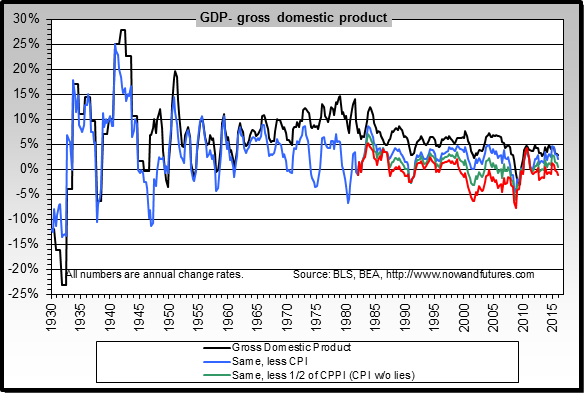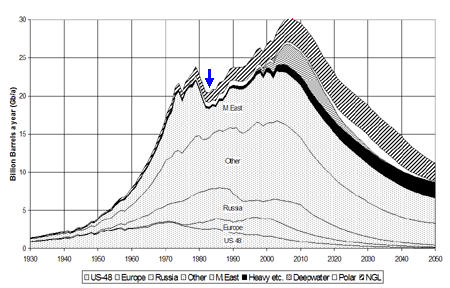Re: Recession without Romance
Thanks. The referenced paper was instructive as you said.
As for taking the Fed's forecasts with a grain of salt, here's someone of advanced years that apparently agrees with you...
Mrs. Moskowitz Has Some Input for Mr. Bernanke:
By Caroline Baum
Nov. 23 (Bloomberg) -- Dear Chairman Bernanke:
I read with interest your speech of Nov. 14 in which you outlined the Federal Reserve's steps toward greater openness. I was particularly interested in reason No. 4 on the ways in which transparency increases the effectiveness of monetary policy. ``Open discussion of the central bank's analyses and forecasts invites valuable input and feedback from the public,'' you said.
Chairman Bernanke, you don't know how good it makes me feel to know that you find my input valuable! Your predecessor, Alan Greenspan, wasn't interested in hearing from me. He wasn't much interested in hearing from his policy committee either, based on what I've read.
I wanted to wait until you and your colleagues released the new three-year economic forecasts before I wrote you with my ideas and questions. Now that I've digested the information, the numbers and the distribution of participants' projections (OK, I had some trouble with the last one), I'm ready to rock.
Let me start by saying I'm all for better communication. You can't imagine how frustrating it is straining to hear Mrs. Olson at our Friday bridge game here at the assisted-living center. If she talked more clearly -- she says it's my hearing -- we might actually end up in the right contract.
No Green Bananas
What I don't understand is why forecasting the economy's growth, inflation and unemployment rates in 2010 is going to help me, as you said in the minutes, or help me help you, as you said in your speech. As a senior citizen, I don't buy green bananas. I don't buy in bulk. I don't even buy next year's date book until I've got one foot in the new year.
I'm not going to change my behavior one iota based on the 2010 outlook.
At the same time -- and I mean no disrespect -- how can anyone know what's going to happen between now and 2010? Even the smartest, most highly trained economists can't predict the future with any degree of certainty, as you yourself have said. Sometimes they can't see what's coming one month out.
Back in August, you thought you might have to raise short- term interest rates to fight inflation. Ten days later, you started to lower them. In late 2000, the outlook underwent the same sort of sudden turnaround. I have to wonder if things change that quickly or you Fed folks are slow to notice.
If you don't know where your target interest rate is going to be one month from today, how can you possibly know how fast the economy will grow and what inflation will be in two to three years?
What's `Appropriate?'
I understand that these forecasts are goals, at least in the long run. What we don't know, and what you aren't telling us, is what it takes to get from point A to point B. You said projections are based on committee members' assessment of ``appropriate monetary policy.''
Could you be more specific?
To say that appropriate is the ``future policy'' most likely to achieve the Fed's dual mandates of maximum growth and price stability doesn't mean much to me. If you can't put an exact number on it, how about giving us the direction? ``Higher'' or ``lower'' would help.
I like the fact that you are making these changes with an eye toward those of us on Main Street, not just on Wall Street. Still, some of the discussion from the meeting goes over my head.
For example, why was the decision to cut rates on Oct. 31 a ``close call'' if monetary policy was ``somewhat restrictive'' and the economy is facing ``substantial downside risks?'' When I go to see Dr. Rosen and my blood pressure is up and he tells me I'm at substantial risk of a stroke, trust me, it's no ``close call.'' He puts me on meds right away.
Return Mail
I realize you're a busy man, what with real estate in the soup and folks losing their homes. But it would sure mean a lot if you could get back to me on a few of the points I brought up. The folks here didn't believe me when I told them you were interested in my feedback. I bet a personal letter on official Federal Reserve stationery would convince them otherwise.
I look forward to corresponding with you in the future.
Very truly yours,
Minnie Moskowitz Delray Beach, Florida
(Caroline Baum, author of ``Just What I Said,'' is a Bloomberg News columnist. The opinions expressed are her own.)
Link:
http://www.bloomberg.com/apps/news?p...d=aT4Q1mcUK9x4
Originally posted by EJ
View Post
As for taking the Fed's forecasts with a grain of salt, here's someone of advanced years that apparently agrees with you...

Mrs. Moskowitz Has Some Input for Mr. Bernanke:
By Caroline Baum
Nov. 23 (Bloomberg) -- Dear Chairman Bernanke:
I read with interest your speech of Nov. 14 in which you outlined the Federal Reserve's steps toward greater openness. I was particularly interested in reason No. 4 on the ways in which transparency increases the effectiveness of monetary policy. ``Open discussion of the central bank's analyses and forecasts invites valuable input and feedback from the public,'' you said.
Chairman Bernanke, you don't know how good it makes me feel to know that you find my input valuable! Your predecessor, Alan Greenspan, wasn't interested in hearing from me. He wasn't much interested in hearing from his policy committee either, based on what I've read.
I wanted to wait until you and your colleagues released the new three-year economic forecasts before I wrote you with my ideas and questions. Now that I've digested the information, the numbers and the distribution of participants' projections (OK, I had some trouble with the last one), I'm ready to rock.
Let me start by saying I'm all for better communication. You can't imagine how frustrating it is straining to hear Mrs. Olson at our Friday bridge game here at the assisted-living center. If she talked more clearly -- she says it's my hearing -- we might actually end up in the right contract.
No Green Bananas
What I don't understand is why forecasting the economy's growth, inflation and unemployment rates in 2010 is going to help me, as you said in the minutes, or help me help you, as you said in your speech. As a senior citizen, I don't buy green bananas. I don't buy in bulk. I don't even buy next year's date book until I've got one foot in the new year.
I'm not going to change my behavior one iota based on the 2010 outlook.
At the same time -- and I mean no disrespect -- how can anyone know what's going to happen between now and 2010? Even the smartest, most highly trained economists can't predict the future with any degree of certainty, as you yourself have said. Sometimes they can't see what's coming one month out.
Back in August, you thought you might have to raise short- term interest rates to fight inflation. Ten days later, you started to lower them. In late 2000, the outlook underwent the same sort of sudden turnaround. I have to wonder if things change that quickly or you Fed folks are slow to notice.
If you don't know where your target interest rate is going to be one month from today, how can you possibly know how fast the economy will grow and what inflation will be in two to three years?
What's `Appropriate?'
I understand that these forecasts are goals, at least in the long run. What we don't know, and what you aren't telling us, is what it takes to get from point A to point B. You said projections are based on committee members' assessment of ``appropriate monetary policy.''
Could you be more specific?
To say that appropriate is the ``future policy'' most likely to achieve the Fed's dual mandates of maximum growth and price stability doesn't mean much to me. If you can't put an exact number on it, how about giving us the direction? ``Higher'' or ``lower'' would help.
I like the fact that you are making these changes with an eye toward those of us on Main Street, not just on Wall Street. Still, some of the discussion from the meeting goes over my head.
For example, why was the decision to cut rates on Oct. 31 a ``close call'' if monetary policy was ``somewhat restrictive'' and the economy is facing ``substantial downside risks?'' When I go to see Dr. Rosen and my blood pressure is up and he tells me I'm at substantial risk of a stroke, trust me, it's no ``close call.'' He puts me on meds right away.
Return Mail
I realize you're a busy man, what with real estate in the soup and folks losing their homes. But it would sure mean a lot if you could get back to me on a few of the points I brought up. The folks here didn't believe me when I told them you were interested in my feedback. I bet a personal letter on official Federal Reserve stationery would convince them otherwise.
I look forward to corresponding with you in the future.
Very truly yours,
Minnie Moskowitz Delray Beach, Florida
(Caroline Baum, author of ``Just What I Said,'' is a Bloomberg News columnist. The opinions expressed are her own.)
Link:
http://www.bloomberg.com/apps/news?p...d=aT4Q1mcUK9x4


Comment